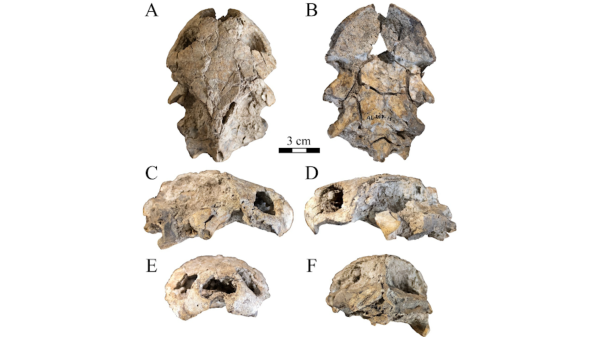Stress comes in many shapes and sizes.
There’s the everyday stress of preparing for a final exam or being stuck in traffic. And the more significant stress of losing a friend, family member, marriage or job.
Then there's chronic stress — which goes on for so long that it becomes the new norm.
These external stressors have a direct link to the inner workings of the mind and body — and if left unchecked can wreak havoc on a person’s health. Stress can be responsible for everything from weight gain to strokes and even brain damage.
As part of April’s National Stress Awareness Month, Arizona State University Professors Leah Doane and Cheryl Conrad help explain the science of stress, especially chronic stress, including the impact it can have on our physical and mental health.
The researchers, together with Erin Trujillo, director of ASU Counseling Services, also offer simple strategies that, when practiced regularly, can reduce stress and restore health.
Stressing the good and the bad
Stress is not always negative — it can energize us and even help enhance performance. It can produce resiliency and turn out tough people.
Sometimes it’s even necessary to survive.
“For most folks, it's actually a good thing that we have a responsive physiological stress system,” said Doane, a professor in ASU’s Department of Psychology. “It's evolutionary. You see a bear, it runs toward you, your stress response system turns on and you run away, and hopefully you've saved your life.”
But when it’s prolonged over a period of time, it can turn into a problem.
“In recent history, what has really become the issue is when the stress response doesn't shut off,” said Doane, whose research examines the links between stress, sleep and mental health.
According to Mayo Clinic, chronic stress can impact physical health, causing digestive problems, headaches, muscle pain, high blood pressure and heart attacks.
It also influences cognitive functioning such as memory, focus, decision-making, mental speed and more. It can mess with emotion regulation and many times causes depression.
Stress and sleep are also strongly linked — sometimes in a reciprocal relationship. Lack of sleep impacts a person’s ability to perform daily activities — whether at home, work or perhaps at school — and problems caused by underperforming keeps people up at night.
Doane says sleep issues are often a part of the college experience, especially for those whose schedules vary from day to day.
“Many students who wake up for a 10 a.m. class one day and a 1 p.m. class the next day are literally putting themselves through an East Coast–West Coast jet lag on a daily basis, which takes a toll on their bodies,” she said.
Stress — the new norm
Doane says there are many factors making our lives more stressful today than ever.
The pandemic was a stressor that everyone experienced. She calls it "collective stress." The American Psychological Association describes it as a "collective trauma" in the association’s study “Stress in America 2023: A Nation Recovering from Collective Trauma.”
The trauma was caused, in part, by the loss of more than 1 million Americans and the changes that have occurred in our culture since the onset of COVID-19 — changes in the workplace, the community and more.
“What we have to understand is that it is actually a vulnerability — a group-level vulnerability that may exacerbate the more day-to-day stressors,” Doane said.
The study found lasting psychological impacts of this global crisis across all age cohorts in America, with the highest stress levels among ages 35 to 44.
Some of the most significant sources of stress in their lives are the future of our nation, violence and crime, followed by the U.S. debt, mass shootings, social divisiveness and health care.
Ties to technology also make it hard to escape these stressors.
“In the past, when people came home after work they were able to detach,” said Doane, the principal investigator at ASU’s Adolescent Stress and Emotion Lab. “... If there were stressors, they were more localized. Today, there is an ongoing barrage of information about what’s happening around the world.”
The report stated that “racial injustice, inflation and climate-related disasters are also weighing on the collective consciousness of Americans.”
Then there are less obvious stressors, such as emotional baggage that people carry with them throughout their lives — sometimes even beyond their conscious reach.
Doane claims that these can be caused, in part, by childhood trauma or life experiences.
“This area is underresearched, and people are not always aware of the role that it plays in their life,” she said.
The brain's reaction to chronic stress
The longer people live with stress, the higher the likelihood of negative impacts on their physical and psychological well-being.
Here’s why:
Stress involves nearly every aspect of the brain, with three regions in particular. The hippocampus is responsible for memory formation, especially knowledge of facts and daily activities. The amygdala is important in emotional processing, and the prefrontal cortex is involved with thought and action.
“It is well known that chronic stress disrupts these three key brain regions,” said Conrad, who was recently named a Highly Ranked Scholar by ScholarGPS for her studies on chronic stress.
When the stress response system goes to work — aka the fight-or-flight response — the amygdala helps detect the stressful event. An alert is sent to the hypothalamus, which releases the hormones adrenaline and cortisol.
Within a minute, adrenaline increases both the heartbeat and blood pressure, among other things — preparing the body to either take up fight or flee.
“Cortisol peaks after 15 minutes or so of the threat to help move energy from the body and make it readily available in the blood,” Conrad said. “This is why you do not collapse from potential hypoglycemia within a half hour of a new threat. Adrenaline and cortisol work hand in hand to ensure your body functions optimally for its current situation.”
Once the threat subsides, the body returns to its normal state.
With chronic stress, the body may not return to its normal state. When that happens, stress can actually change the structure of neurons in the hippocampus, reduce their ability to receive input from other neurons and even reduce the size of the hippocampus. This can lead to difficulties in learning, memory and emotional regulation.
And all of this can weaken the immune system and even cause an imbalance in gray and white matter, which can lead to permanent changes to the brain's structure.
Conrad’s research focuses on the behavioral neuroscience of stress. She links chronic stress to cognition, anxiety and mental health issues, such as depression.
“Chronic stress is linked to depression, which includes symptoms of anhedonia (the loss of interest in things that were once pleasurable) and feelings of great sadness.
“Chronic stress and depression overlap in many key brain regions.”
She said chronic stress can also cause anxiety, post-traumatic stress disorders and even Alzheimer’s disease. Her research involves investigating the mechanisms by which stress influences brain plasticity and resilience.
Hope for healing
Understanding how stress impacts the body and cognitive functioning helps provide important insights into developing strategies that may reduce the negative effects of stress.
Conrad explores nonpharmacological interventions, such as cognitive behavioral therapy, to support mental well-being.
Simple actions like exercise, socialization and enrichment in activities one enjoys, as well as novelty, can make a difference in stress-induced depression, she says.
The brain and body can recover from stress through neuroplasticity, which is the ability of neural communication pathways to reform, she said. However, the reversibility of these changes depends on the type and duration of the stress.
Stress-induced brain changes can be reversed with pharmacological interventions like antidepressants, according to Conrad.
She says that the current pharmaceuticals available to treat depression and other mental health issues are somewhat of an unspecific approach.
“We’re giving it to them because we think it will be helpful. … Because the statistics say it could be helpful. But not everybody benefits right?” she said. “Many individuals fail to respond or relapse.”
Conrad is trying to research methods that would determine what treatment would be best for each individual by exploring differences in neurochemistry.
Ways to reduce stress
Erin Trujillo, director of ASU Counseling Services, says that “for all forms of stress, a recovery plan is so beneficial.”
Here are researched strategies that can help reduce stress:
• Humming, singing or activating our vagus nerve, which is a major part of our rest system (parasympathetic nervous system).
• Laughing.
• Hugging someone we trust for 20 seconds.
• Speaking out loud (even to yourself) about your day.
• Securing a perspective of gratitude for something within our day.
• Connecting with the living, such as humans, pets and nature.
• Moving — walking, stretching and dancing. Doing any of those motions before we sleep to help our bodies and minds rest for the night.
“And then we can go in there and target it."
Solutions to chronic stress and strategies for success
Psychological science has revealed that long-term stress may make people feel more sensitive to daily hassles and can have broader impacts on their general life outlook and goals, says Trujillo, adding that coping with long-term stress requires a different set of skills than adjusting to temporary stressors.
One key to addressing chronic stress is for a person to try to become aware of how they respond to stress, she says.
“For some, that means our bodies get very good at activating fight-and-flight hormones. Others may find their anger response gets very quick, escalates rapidly and takes longer to turn off,” Trujillo said. “... Many may begin to experience anxiety or panic symptoms that don’t make sense. For ... others, disruptions in sleep or changes with hunger cues begin to show up multiple days in a row.”
Trujillo recommends finding an approach that lowers the stimulus and restores the body. The reduction of physiological responses is an indicator that an approach or plan is working. Consulting a medical or counseling professional is a great place to begin figuring out what those plans may be.
According to Trujillo, our varied identities shape who we are, including how we are exposed to and how we manage stressors.
“There are so many productive ways to destress; however, our families, friends, communities and society at large shape which of those ways are acceptable,” she said. “It’s important to think about how you were taught to manage stress and whether that is actually working for you.
“It is also helpful to remember that you and your colleagues, friends or partners may have been taught different things or may need different things when feeling stress," she said. “Some people need time alone, others need time with people; some process stress verbally, others use exercise; some want to immediately work through their stress, and others may need a few minutes, hours or days to be ready.
“There is no one single path for managing stress. The more grace we give to one another, the easier we make it for people to not get stuck in a stressful moment or to try a new stress management strategy.”
More Science and technology

New research by ASU paleoanthropologists: 2 ancient human ancestors were neighbors
In 2009, scientists found eight bones from the foot of an ancient human ancestor within layers of million-year-old sediment in the Afar Rift in Ethiopia. The team, led by Arizona State University…

When facts aren’t enough
In the age of viral headlines and endless scrolling, misinformation travels faster than the truth. Even careful readers can be swayed by stories that sound factual but twist logic in subtle ways that…

Scientists discover new turtle that lived alongside 'Lucy' species
Shell pieces and a rare skull of a 3-million-year-old freshwater turtle are providing scientists at Arizona State University with new insight into what the environment was like when Australopithecus…
